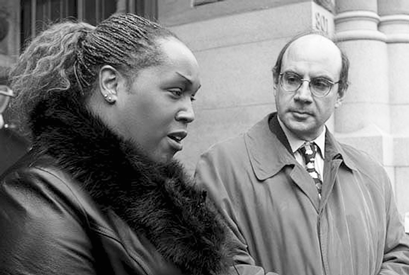Federal appeals court upholds finding that Cincinnati brass blocked female officer’s promotion
In its second ruling in less than a year vindicating the rights of transgendered public safety officers, a panel of the U.S. Court of Appeals for the 6th Circuit in Cincinnati has upheld a jury verdict finding that the Cincinnati Police Department unlawfully refused a promotion to sergeant for Philecia Barnes.
The jury found that the police department violated Title VII of the Civil Rights Act of 1964, which outlaws sex discrimination in the workplace. In its prior ruling last June, the court upheld a discrimination claim by a transgendered firefighter in Salem, Ohio.
In an interesting move that may reflect internal judicial politics, the March 22 opinion for the court was written by U.S. District Judge David W. McKeague of the Western District of Michigan. The 6th Circuit covers several states including Michigan, and occasionally trial judges are assigned to fill out appellate panels in understaffed courts. But it is also possible that McKeague was assigned to write this opinion to take the heat off the circuit judges who hear their cases in Cincinnati, and might be reluctant to take on the local police department.
Both of the 6th Circuit decisions rely on the “sexual stereotype” theory, approved by the Supreme Court in 1989 in the case of Price Waterhouse v. Hopkins. In that case, a woman was denied a partnership in the accounting firm because some of the partners thought her conduct was insufficiently feminine to conform to their expectations of a “lady partner.” The Supreme Court ruled that when an employer bases employment decisions on stereotyped thinking about appropriate sex roles, the employer is discriminating “because of sex” in violation of Title VII.
In both the Salem case and the new Cincinnati case, the 6th Circuit has applied that theory to transgendered people, who by definition fail to conform to gender stereotypes.
The plaintiff in this case, born Phillip Barnes, “was living as a pre-operative male-to-female transsexual in 1999 when she failed the probationary period required to become a police sergeant,” wrote McKeague.
Barnes had worked as a Cincinnati police officer since 1981, and ranked 18 out of the 105 officers who took the promotional test for sergeant in July 1998. The high score entitled Barnes to a probationary promotion, but the police department brass opposed the idea of a transsexual sergeant. According to McKeague’s opinion, at the time of the promotion, “Barnes was a male-to-female transsexual who was living as a male while on duty but often lived as a woman off duty.”
McKeague noted that Barnes had a reputation throughout the police department as “a homosexual, bisexual or cross-dresser. No other male sergeant was known to be gay or have a feminine appearance,” although there were several lesbian officers.
Another officer who was more supportive of Barnes, Lt. Charles Ross, “testified that when Barnes arrived at District One for his probationary period, people did not take him as seriously as they should. Barnes was living off-duty as a woman, had a French manicure, had arched eyebrows and came to work with makeup or lipstick on his face on some occasions.”
Wilger reported to the head of Division One that Barnes, who now lives as Philecia, was a problem case, and soon a special probationary routine was devised just for her. Unlike the other probationary sergeants, Barnes was closely monitored, every slight flaw or deviation from rules was scrupulously noted, and she became so nervous under the stress that he began committing more serious errors. In other words, according to evidence summarized by McKeague, Barnes was set up to fail from the outset, and at least one sympathetic officer told her as much.
The city objected to this comment being included in Barnes’ testimony, attacking it as “hearsay,” but the court found its admission to be a “harmless error” in light of all the other evidence.
The police department relied on the litany of flaws and errors to justify refusing to make Barnes’ promotion permanent, even though it appears that at least one other probationary sergeant with lower probationary rating scores than her was given a permanent promotion.
Barnes sued in federal court under Title VII, claiming sex discrimination. District Judge Susan J. Dlott, rejecting two pre-trial motions by the city seeking to dispose of the case, sent it to the jury, which responded to the evidence with an award of $150,000 in compensatory damages, $140,000 in front pay, and $30,511 in back pay.
Dlott also awarded fees of $527,888 to Barnes’s attorney, the well-known gay rights advocate Alphonse A. Gerhardstein, who has been involved in most of the important gay rights litigation in Cincinnati. More than $25,000 in court costs were also awarded.
Facing a payout of almost $875,000, the city filed post-trial motions, all denied by Dlott, and then appealed the case.
The Court of Appeals affirmed the verdict down to the very last penny, finding that there was plenty of evidence in the trial record from which the jury could conclude that Barnes’ gender non-conformity played a significant role in the denial of her promotion. Perhaps more significantly, the court treated last June’s Salem case as well-established precedent, saying that the prior opinion “instructs that the city’s claim that Barnes was not a member of a protected class lacks merit. [That] court held that the district court erred in granting a motion to dismiss by holding that transsexuals, as a class, are not entitled to Title VII protections, stating: ‘Sex stereotyping based on a person’s gender non-conforming behavior is impermissible discrimination, irrespective of the cause of that behavior; a label, such as transsexual is not fatal to a sex discrimination claim where the victim has suffered discrimination because of his or her gender non-conformity.’”
The city was particularly vehement in attacking the attorney fee award. McKeague wrote that Dlott had correctly applied a multiplier of 1.75 to Gerhardstein’s hourly rate because of the “novelty and difficulty” of the issues and the “immense skill requisite to conducting this case properly… The court found the result achieved was extraordinary and the case was highly controversial, based on the affidavits of two Cincinnati attorneys who stated that few lawyers locally or nationally would take such a case.”
In light of the amount at issue, one expects the city will try to get this decision reviewed by the full 6th Circuit or even appeal to the Supreme Court.
gaycitynews.com



































